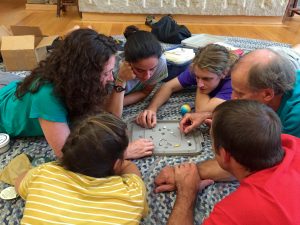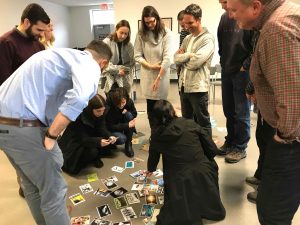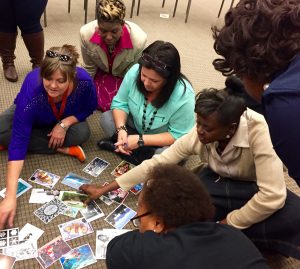Jan 18, 2018 Meaningful Reflection Brings Learning to Life
Reflection brings learning to life. It is the essential ingredient in education, training, therapy, and team-building that promotes growth and change in learners. It is the catalyst for creating meaningful and lasting lessons from experiences. A quote often attributed to John Dewey—and a summary of his philosophy—states, “We do not learn from experience. We learn from reflecting on experience.” Reflection has many different names in the experiential education field, including processing, reviewing, and debriefing. I have moved toward referring to this key ingredient in teaching and group facilitation as “reflection” or “reflective practice.” Ongoing reflective practice creates opportunities for learners to connect the skills they use in a contrived environment (i.e., classroom, challenge course, corporate training, therapeutic group session) to real life issues such as resolving conflicts with peers, dealing with frustration, expressing their opinions, and setting goals and priorities.

Reflective practice fosters an emotional connection to the material being learned. It helps the learner internalize the lesson, creating ownership in learning and developing insight, one of the most critical life-long skills to acquire. When we engage learners in ongoing reflection in our programs and courses, we not only help them retain and apply or transfer lessons learned to other areas of their lives, we promote their ability to become more reflective, introspective learners in the future.
The Brain, Learning, and Reflection The educational, neuroscience field reinforces Dewey’s view that reflection is key to learning, confirming that reflection creates context, promotes the development of multiple pathways to learning, and facilitates meaning-making from lessons. Our brains search for patterns and relationships in experiences. Patterning is the term neuroscientists use to describe this process in which the brain searches for patterns to construct meaning from input received. Learning takes place when the brain uses these patterns and attaches meaning to them.

Brain researchers are finding that knowledge increases through pattern recognition and by matching new information to memories. This creates more extensive neural networks. We tend to remember things when we think we have seen them before. When new information is related to prior knowledge, learning extends beyond the domain in which it occurred—transferring to new learning and problem-solving situations (Willis, 2010a).
Positron Emission Tomography (PET) scans show that when people encounter new information their brains activate stored memory banks. When these connections are made, long-term memory is enhanced. We pay attention to and remember information that is meaningful to us (i.e., relevant to our survival, interesting to us, useful in promoting our success). Meaning creates important structure around detail. When we have association or context to a lesson—an emotional connection and sense of relevancy in regards to learning—we are more likely to remember it. Reflection and metacognition (thinking about thinking) enhance this process of meaning-making by intentionally helping learners explore the patterns that connect the experience with real life application, context, personal meaning, and relevancy.
Reflection helps learners understand HOW information is relevant to them and specific ways they can apply the information learned in the future. Powerful experiences, ongoing practice, and varied stimuli enhance multiple-pathways to learning. The more ways (e.g., movement, artwork, writing, social-interaction) a learner reflects upon and applies the information learned and the more personal the learning experience is, the stronger the neuronal connections and the more pathways to storing and recalling the information are created. Educational neuroscientists such as Judy Willis emphasize the importance of ongoing feedback throughout educational experiences to promote strengthening of neural networks. According to Willis(2014), when learners see they have progressed through a challenge, even if it is not complete, they experience a pleasurable dopamine response and increased intrinsic motivation to continue learning. Ongoing reflective practice is a vehicle for providing this feedback and support to promote buy-in, ownership over learning, and a positive view of learning.

Researchers from Harvard Business School, The University of North Carolina and HEC Paris have been studying the impact of reflection on learning outcomes (Di Stefano et al., 2014). They found a significant improvement in performance when direct experience was combined with reflection. These researchers believe the process of reflection build’s one confidence and sense of self-efficacy or ability to achieve a goal. Their research demonstrates that reflection plays a critical role in enhancing learning outcomes. “Learning generated by reflection coupled with experience will lead to greater improvement in problem-solving capacity as compared to learning generated by experience alone” (Di Stefano et al., p. 5).
As a proponent of reflective practice in education and group work, I am excited about this research on the brain and learning that is helping us understand WHY reflection is such a key ingredient in learning. It gives a scientific foundation for the practical strategies offered throughout this website and in upcoming posts.
For more information see Tips & Tools for the Art of Experiential Group Facilitation Second Edition.
References: Di Stefano, G., Gino, F., Pisano, G. P., & Staats, B. R. (2014, March 25). Learning by thinking: How reflection aids performance. Harvard Business School Technology & Operations Mgt. Working Paper No. 14-093.
Willis J. (2014). “Brain-based teaching to improve executive functioning.” Lecture conducted at the Learning & the Brain Conference: Engaging 21st Century Minds. Boston, MA



No Comments